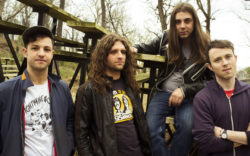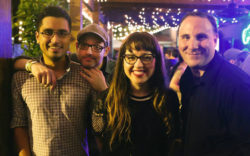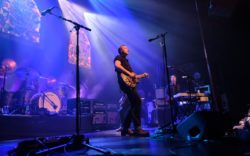Welcome to Behind the Scene, a biweekly series where Flagpole and DTproductions profile the people who work offstage to make Athens music matter.
Photo Credit: Porter McLeod
Colm O’Reilly and Roger Levine
WHO THEY ARE: Colm O’Reilly & Roger Levine
WHAT THEY DO: Sound engineers at the Georgia Theatre
WATCH:
Flagpole: How did you wind up in your position?
Colm O’Reilly: I was asked to by [Wilmot Green, owner of the Georgia Theatre] when it reopened after the fire. Before that, I had hung the old PA right before Wil bought the place. I did a few sort of sit-in, fill-in-for-people gigs here and there. I then came on full time after the fire.
Roger Levine: I had been touring with DubConscious for five years and basically got tired of the road. I knew Scott [Orvold] and Wil. They were friends of mine. They hired me on so that I could regain my sanity. [laughs]
Are there moments during a show when you’re enjoying yourself?
RL: I actually have trouble with that—with enjoying a show. Even if it’s a band I like, this place is so ingrained with ‘work’ for me that all I can do when I’m working is, not necessarily hear the notes, but be the soundguy. And it’s actually harder for me now when I go see shows elsewhere, because all I can think about is the production. So, it’s kind of ingrained in my head.
CO: It’s the same for me, even going outside of work to see anything. My wife hates going to shows with me, because I will disappear and hang out behind the sound desk and have a listen from [that] perspective. But, there are some shows here where stuff will just blow you away. I think it’s easier for us if we have a band that comes in with one of their own engineers and we’re essentially babysitting and there to help them out if anything goes wrong—[we’re there] mostly to just set it up and tear everything down at the end of the night. But if the soundguy is really good and you’re not worried, there are moments that will blow you away. Like Ladysmith Black Mambazo—it was amazing.
Are there any memorable shows you would put at the top of your resume?
CO: I did a few runs with Vic Chesnutt, a couple of tours. There was one gig where we were in Dresden, Germany and I think we had been out for a few weeks. He had just done an Athens show and I forget where it was exactly, but I couldn’t get over how loud and noisy and chatty everyone was being during his set. And it pissed me off, but here we are a month or so later in Dresden and you could hear a pin drop through the entire set, or they were singing along with the words for several songs. That was mind-boggling.
RL: For me, it’d probably be Victor Wooten. Maybe that’s not the band to write home and say, “I helped run sound for this band.” But, I was on monitors that night and it was one of the hardest monitor nights I’ve had here, just really complicated. It was Victor Wooten and Friends, so they had two drum kits, four basses. My mind was completely blown. I’ve known Victor from the past and I know he’s an amazing bassist, but his entire backing band was crushing all night, the same talent as him or better, in my opinion. Ever since then, that’s been my jaw-dropping moment, for sure.
What advice do you have for bands playing live?
CO: Show up on time. And, basically, get [set] up quickly. [laughs] And then don’t make noise when we’re pulling it all together or wiring it up, because there’s nothing worse that putting a mic on a snare and a drummer decides at that point to hit [their] cymbal. Or you’re mic-ing a guitar amp and a guitar player just goes ‘krang!’
RL: When bands come [to the Theatre] for the first time, they see that it’s more of a professional atmosphere. We’re given the tools to do the job correctly, so there’s a respect from the get-go, opposed to what might’ve been the night before in some shady club where they’re not getting what they want. Automatically, I think they’re more on the same page and have more respect when they come in.
CO: Like the Dexateens, the last time they came here with the [Drive-By] Truckers. They had just done a really shitty gig the night before and they went, “Ah, yeah!” And, then, their gig rocked.
RL: Get them happy from the get-go and, usually, everything works out great.
Can you describe your daily routine?
CO: First off, I’m daddy-taxi, so I’ve got to get up and get the kids to school. That might be after getting home at 1, 2, 3 a.m. And then, if I can, do a little bit of yoga. If we have an early load-in, I’m back here. Usually, that’s not too often. Usually, our load-ins are 3 p.m. I’ll spend a few hours advancing the upcoming shows, a few weeks ahead. There may be some meetings or there may be some maintenance between here and Green Room. And then 3 p.m. rolls around and you have load-in—that’s basically getting everybody set up, wired, mic’d and soundchecked. Then we grab something to eat. And then it’s showtime. Then, we tear it all down and we’re out of here about an hour to an hour-and-a-half after the show.
RL: I don’t have mornings like Colm. I’m single, so I sleep all day. I like to get here about an hour early to get the stage prepared. We like to have everything by the time they open the doors—monitors up, mics. From there, it’s soundchecking and changing over to opening bands. We grab a dinner, come back and do the show. Sometimes it’s a long day, but [it’s] generally enjoyable either way… Usually when we have downtime, we mess with Green Room, which is our other responsibility. There’s a lot of work that goes into that as well, maintaining that place.
Like what you just read? Support Flagpole by making a donation today. Every dollar you give helps fund our ongoing mission to provide Athens with quality, independent journalism.










